Breast Cancer Facts | Part 2
Breast Cancer Facts. Part 2
There are many facts and statistics surrounding breast cancer. Here are more interesting facts about the disease that most people do not know.
Breast Cancer Fact 1. Breast cancer was originally known as a nuns disease. This was due to the fact that more nuns were diagnosed with the disease. Researchers believe this was due to the fact that nuns did not have children, therefore had more periods, and more exposure to estrogen during their lifetime.
Breast Cancer Fact 2. 8 out of 10 lumps that are found are noncancerous. This means that 80% of lumps are not cancer. Nonetheless, don’t let this statistic cause you to ignore any lump.
Breast Cancer Fact 3. Every 19 seconds someone in the world is diagnosed with breast cancer. By the same token, this equates to approximately 3 people being diagnosed every hour. Moreover those calculations come to 75 people being diagnosed per day.
Breast Cancer Fact 4. One woman will die of breast cancer every 13-15 minutes in the United States. This startling statistic is one woman too many. Additionally, with early detection along with treatment, breast cancer is a treatable disease.
Breast Cancer Fact 5. The good news is that there are nearly 3 million breast cancer survivors in the United States. This number has increased over the years. With early detection and treatment this number can continue to increase.
Breast Cancer Fact 6. Lastly, research has shown that the left breast is more prone to developing breast cancer than the right breast. Scientists are not sure why this is true. In light of this research, my breast cancer was found in my right breast.

Breast Cancer Facts
Breast Cancer Statistics, A Moving Target
These statistics are purely estimates and are ever changing. Available information and data surrounding breast cancer is constantly changing as research is becoming more advanced. Additionally, another reason for variances can be due to the varying time periods for which the data is collected and reported.
Breast cancer awareness is at an all time high in the month of October, but for a breast cancer survivor, like myself, every month deserves the same amount of attention. Be aware and be knowledgeable about this disease, one that affects so many women today.
- Published in breast cancer, breast cancer facts, Uncategorized
Breast Cancer Facts | Part 1
Breast Cancer Facts. Part 1
There are many facts surrounding breast cancer. Some facts are unknown, some are well known, while others are startling. Being informed regarding the facts of breast cancer can save your life.
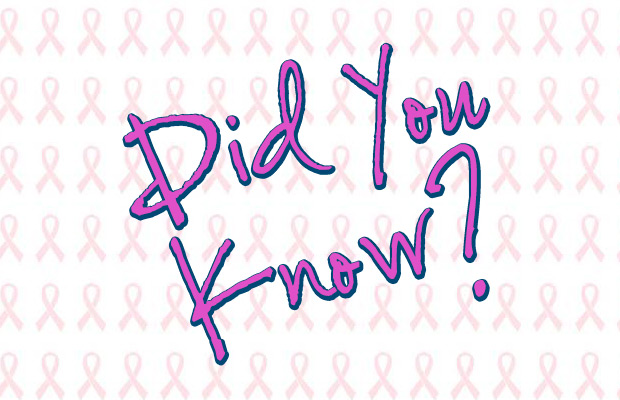
Breast Cancer Facts
Last year in 2016, 246,660 new cases of invasive breast cancer was diagnosed. Moreover, an additional 61,000 non-invasive cases were also diagnosed.
Breast cancer is the 2nd leading cause of cancer deaths among women in the US. This is 2nd only to lung cancer.
Over 2,000 men are diagnosed with breast cancer annually. This is despite the fact that women are 200 times more likely to develop breast cancer.
Breast feeding for one year or more slightly decreases your risk of developing breast cancer. It is thought to be related to the fact that breastfeeding interrupting periods. Fewer periods, means less estrogen exposure. Further research also attributes this decreased risk to changes in the breast that occur after lactation.
8 out of 10 lumps are discovered by women themselves. This equates to 80% of all lumps. This further validates the need for self breast exams.
Only 42% of women who undergo a mastectomy go on to have breast reconstruction. Breast reconstruction is such a delicate subject. Treatment for breast cancer can be so emotionally draining, that some women are too exhausted to go through with reconstruction.
While there are many facts and statistics surrounding breast cancer, it is important to seek the expertise of a physician if you questions, concerns, or uncertainties.
- Published in breast cancer, breast cancer facts, Facts, Uncategorized
Breast Cancer Risk Factors | Are You At Risk For Developing Breast Cancer?
Breast Cancer Risk Factors. Are You At Risk?
There is no way to prevent breast cancer, however knowing your risks, can help decrease your chance of developing breast cancer. There are several risk factors that put women at risk for developing breast cancer. Some of these risk factors are hereditary and can not be modified, while there are some that can be modified. Moreover, changing those risk factors that can be changed can decrease your chance of developing breast cancer tremendously.
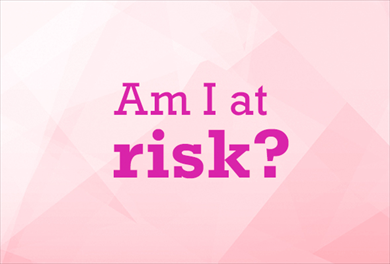
Breast Cancer Risk
Nonmodifiable Risk Factors
Being a Female. Though men can also get breast cancer, women are 100 times more likely to diagnosed with breast cancer.
Aging. Most breast cancers occur in women 55 years or older. More and more women are being diagnosed at a younger age.
Early Menstruation/Late Menopause. Starting your menstruation before the age of 12 increases your risk. This is due to having a longer lifetime exposure to estrogen. Likewise, having late menopause also poses a risk for the same reason.
Family History/Genetics. Only 5%-10% of breast cancers are thought to be hereditary. This is caused by genes passed down from a parent to their child. Likewise, 85% of women diagnosed with breast cancer have no family history.
Personal History. Having a previous cancer or radiation treatment to the chest or face, increases a women’s risk for developing breast cancer.
Ethnicity. White women are at a slightly higher risk for developing breast cancer than African American women. African American women, however, are more likely to be diagnosed before the age of 45. Furthermore, African American women are also more likely to die from breast cancer.
Modifiable Risk Factors
Obesity in Older Women. The link between weight and breast cancer risk is complicated. Ovaries, as well as fat tissue produce estrogen. Estrogen is linked to breast cancer. As women age and go through menopause the ovaries stop producing estrogen. Being overweight after menopause means that your fat tissue is still producing estrogen. Staying active, especially after menopause can decrease this risk factor.
Late or No Pregnancy. Unfortunately in some cases this is an unmodifiable risk factor. Nonetheless, the effects of pregnancy can vary for different types of breast cancer.
Taking Hormone Replacement for Greater than 5 years/Oral contraceptives. The risk varies depending on whether it is hormone replacement following menopause or taking oral contraceptives with hormones to prevent pregnancy. Most importantly, the time frame after stopping these hormones affect your risk of developing breast cancer.
Dense breast. Women with dense breast are at an increased risk for developing breast cancer. Dense breasts often make it more difficult to detect breast cancer by mammogram.
Drinking alcohol. Your risk increases with the amount of alcohol consumed. Drinking more than 1 drink per day increases your risk.
This is not an all inclusive list of risk factors as cancer research is ongoing. Some other risk factors with unclear effects on breast cancer include; tobacco smoking, chemicals in the environment, and even working night shift. Knowing your breast cancer risk is very important. Regardless of your risk, everyone should be screened for breast cancer. Early detection is the key to survival. Breast cancer can affect anyone, as it crosses racial and social barriers. No one is immune to breast cancer.
- Published in breast cancer, risk factors, Uncategorized
My Hair Loss and Regrowth Journey
My hair loss and regrowth journey. Like many women with cancer, chemotherapy caused me to lose all of my hair. Yes, every…single…strand. My hair loss and regrowth journey will never be forgotten.
My Hair Loss Journey
Though the hair loss was an expected side effect, I was not fully prepared when the day came. Several people advised me to cut my hair before it fell out, but I could not bring myself to do it. Mostly because I secretly hoped I would be in the slim percentage that didn’t lose my hair. However, I made a decision that at the first sign of hair loss, I would cut it all off. It was estimated that I would lose my hair after the 2nd chemotherapy treatment and boy was that prediction spot on. The day following my second treatment, I brushed my hair in preparation for my follow up appointment and there it was, a brush full of hair! Funny thing is that I never even felt it coming out. Looking at the brush full of hair was extremely scary.
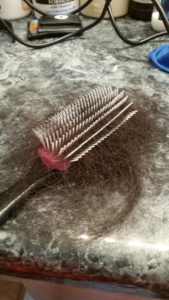
Initially, I panicked and freaked out a bit. “Oh my god, was this really happening?” I wasn’t ready. Truthfully, I would never be ready. I immediately stopped brushing and wore a hat that day and did not comb my hair again for 2 days. My mom was already on stand by to shave my head when I was ready. Unfortunately it was now time to face my fear. My daughter insisted on watching my mother shave my head. This made her sad. Although I pretended to be strong, that strength only lasted for a few minutes.
Saying Goodbye
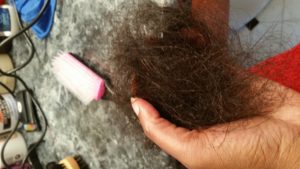

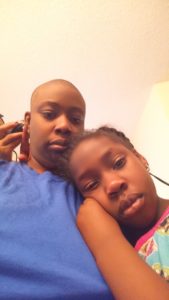
When we first learned that I would need chemo, my mom knew this would be a hard adjustment for me, therefore she vowed that when I lost my hair she would shave hers as well. As soon as she was done shaving my head, without saying a word, she then did her own.
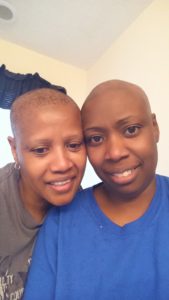
This was an emotional day. Once of the most emotional days since my diagnosis. I now looked like a true “cancer patient”. Looking in the mirror was hard and it took me a several days to truly face a mirror. It was a constant reminder that I had cancer even on days when I wasn’t ill and actually felt well. I did not want my kids, nor husband to see me like this. It took a couple months before I would let them see me without a scarf or wig covering my bald head. My 12 year old son took the longest to adjust. Some people eventually get used to having a bald head and some are even able to embrace it. I never got to that point. As a matter of fact, only my parents, children, and husband ever got to see me with a bald head.
As a female with breast cancer, I learned that a big part of the struggle with hair loss is related to loosing everything that you identify with as a female. First your hair, (and I mean every strand of it from every part of your body including armpits and eye brows) and then your breast.
My Regrowth Journey
What a regrowth journey! I have never had short hair in my life. Neither as a child, nor as an adult. And now I had absolutely no hair at all. Don’t misunderstand, short hair works for some people. I quickly realized that having short hair by choice is not the same as not having a choice in the matter at all.

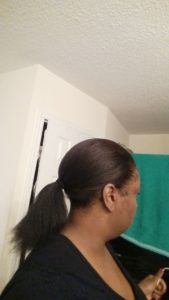
From a clean scalp, to now having a baby afro! My hair is growing back. Still short, but healthy and most importantly still growing. I have decided to share my hair growth journey over the past one year. After despising this comment and hearing it so many times, I can finally now agree that yes, “IT IS HAIR AND IT WILL GROW BACK.”
Everyone’s journey and experiences vary, but despite the differences, it is a difficult time for cancer patients and their families. Support and encouragement are important during this time. Allow your loved one to grieve their hair loss. Allow them to vent. Most importantly, respect their privacy and dignity as they deal with the hair loss in their own way.
- Published in breast cancer, chemotherapy, hair loss, side effects, Uncategorized
10 Common Breast Cancer Myths
You may hear many different breast cancer myths after you are diagnosed with breast cancer. It may be hard for you to separate what is true versus what is not. Here are some of the common myths that you may hear.
10 Common Breast Cancer Myths
1-Most breast cancers run in families.
Yet, only 5%-10% of cases are thought to be hereditary.
2-Breast implants raise your risk of breast cancer.
With implants it may be harder to detect abnormalities on a mammogram, therefore additional X-rays may be ordered.
3-There is nothing you can do to lower your risk of breast cancer.
90% of breast cancers are related to lifestyle and environmental factors. As a result, you can reduce your risk by maintaining a healthy weight, regular exercise, and limit alcohol intake.
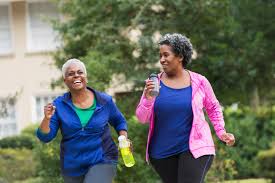
4-Most lumps are cancerous.
It is quite the opposite, with 80% of lumps being benign (noncancerours).
5-Underwire bras can cause breast cancer.
Most noteworthy, there is no evidence to support this.
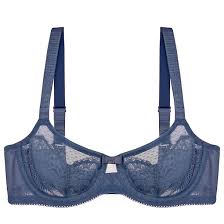
6-Surgery causes breast cancer to spread due to air exposure.
There is no evidence to support this.
7-Regular mammograms prevent breast cancer.
This is not true, however regular mammograms provide early detection.
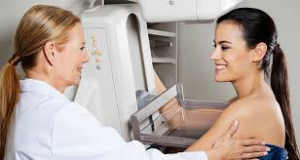
8-Women with small breast have less risk of developing breast cancer.
While this is not true, smaller breast however, may be easier to examine.
9-Antiperspirants cause breast cancer.
Currently there is no evidence to support this.
10-You can not get breast cancer after a mastectomy.
Unfortunately, cancer can spread. Consequently, there can be a reoccurrence in the same breast even after a mastectomy. Reoccurrence can also occur in the opposite breast.
In conclusion, after your diagnosis you may seem like you are getting conflicting information from different sources. First of all, you should always consult your doctor for clarification. Every case of breast cancer is different, so rely on your health care team to provide you with the most relevant information.
- Published in breast cancer, breast cancer myths

